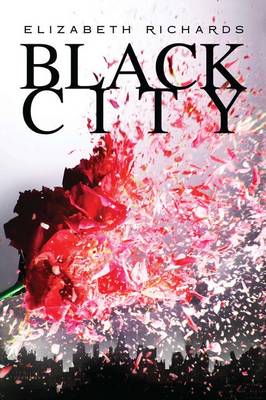Reviewed by Briana @ Pages Unbound on
Review: Black City has an attention-grabbing premise. It is set in a seemingly post-apocalyptic world where Darklings (*coughvampirescough*) are segregated from humans because of their race. The two main characters, obviously, must first recognize their prejudices and then work to overcome the injustices and cruelty enacted by the government of their world. Deep themes and some kick-ass action? It sounds like the ultimate YA read. Unfortunately, it fails to deliver, and generally gives the impression of Twlight in a more interesting setting.
One major parallel between Twilight and Black City is the problematic romance. It is insta-love. There is a love triangle (albeit an unbelievable one). Ash is not as good of a boyfriend as Natalie blindly believes. The first two statements barely need elaboration. The third will need some defense.
(Minor spoilers in this paragraph about their relationship.) Ash is a drug dealer. That alone should send Natalie running. Instead, however, she rationalizes and defends it. She states that she is willing to accept the bad of Ash’s character with his good because she loves him. Now, recognizing that your boyfriend is human (er, half-human) and therefore flawed is one thing, a good thing. Expecting perfection is also bad for relationships. Yet suggesting he need not change major bad habits is dangerous. Couples, recognizing that neither of them is perfect, should help each other to become the best people they can be, instead of excusing negative qualities entirely. Natalie is setting a poor example for teens. Also, in case this was unclear, Ash deals drugs!
(Minor spoilers in this paragraph about their relationship). If that is not enough, Ash is sort of a cheater. He sees one other girl, recognizes he has a physical attraction to her, and is ready to run to her. How…endearing? Richards seems to be attempting to portray some inner struggle that Ash endures (which is clear once you read the book), but she fails. Ash does not struggle. He never tries to push the other girl away at all, but instead welcomes her touch in the name of “discovering which girl he is really attracted to.” It seems to be his opinion that your soul mate is whichever person you have the best time kissing, with her personality being irrelevant. This philosophy gets in the way of my personal interpretation of Ash’s being a kind person and a good boyfriend.
Black City also suffers from the quality of its writing. Individual sentences are fine; Richards clearly does have a wonderful command of the English writing. The overall construction of the novel, however, is flawed. Richards attempts to cram a lot of action into Black City—but very little of it is particularly exciting. In the first place, nothing unexpected happens. Even minor details click into place exactly the way a reader would envision them. There is not an excessive amount of foreshadowing that enables readers to predict plot events, but once plot events do occur, the immediate reaction is not surprise but a shrugged Yeah, that would happen. Secondly, so much happens that none of it is given the time it deserves in build-up, event, or aftermath. In Chapter 17 alone I made note of a sudden romance, a sudden fight, and a sudden death. This was anomaly in that usually each “major” occurrence—such as a dramatic rift between friends—lasts for one or two whole chapters.
The world behind all this events does not fare much better. Black City sounds like a fascinating place, but its history is unclear. To start, whether this novel is set in a future version of our world or in some alternate universe where there is also a United (Sentry) States is unclear. (In Nameless by Lili St. Crow, for example, there are vampiric creatures who suddenly appeared in what was previously our world. The same could be true of Black City, but it is a mystery.) Next, the history of the Darklings is underdeveloped. Readers do learn that the enforced segregation is very recent, having occurred during Natalie’s lifetime. But how did Darklings and humans live together before then? Richards implies it was fairly peaceful—but then later states that if segregation were to end, Darklings would need to find a way to eat besides drugging and feeding on humans. I dislike sounding as if I would be on the racist government’s side in this novel, but if the modus operandi for Darklings had always been to attack, drug, and drain humans, I understand their dislike and fear. In minor details, the word “fragg” as a curse can be annoying (I dislike invented profanity in general, so no offense to Black City), and the fact that Ash’s fangs tend to throb whenever he is angry or amorous is funny and maybe unnecessary. The parallel drawn to male genitals here made me mildly uncomfortable, especially for something that served little purpose.
I dislike having to write such a negative for Black City. I very honestly believed it had potential, first from the summary and second from the fact that Penguin had decided to publish it even though the vampire trend is very close to dead. I trust editors, and they clearly see something special and innovative about Black City. In the end, I just did not see it, too. However, there are a lot of very positive reviews for this book, and if paranormal romance and vampires is something you as a reader really love, this book could work for you. If you like Twilight, especially, I think this has many of the same characteristics—but better.
This review is also posted at Pages Unbound Book Reviews.
Reading updates
- Started reading
- 19 November, 2012: Finished reading
- 19 November, 2012: Reviewed
